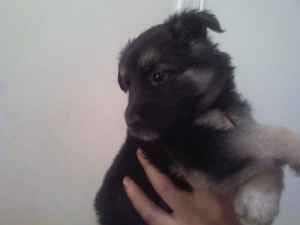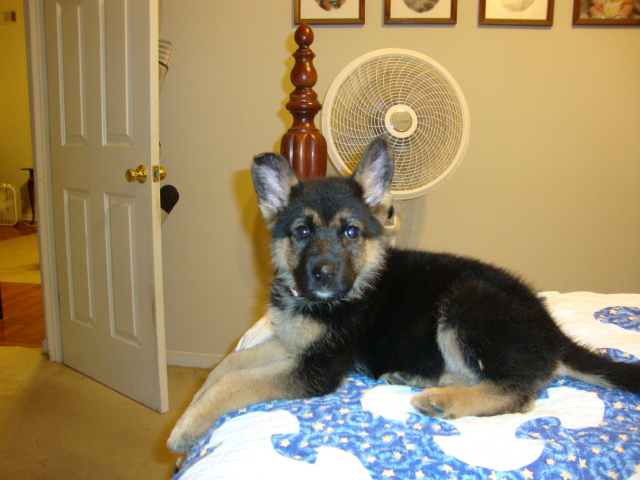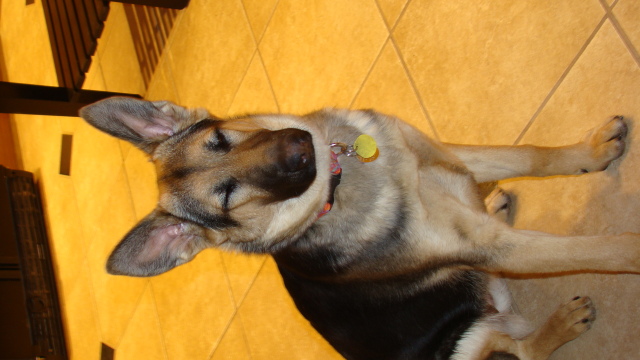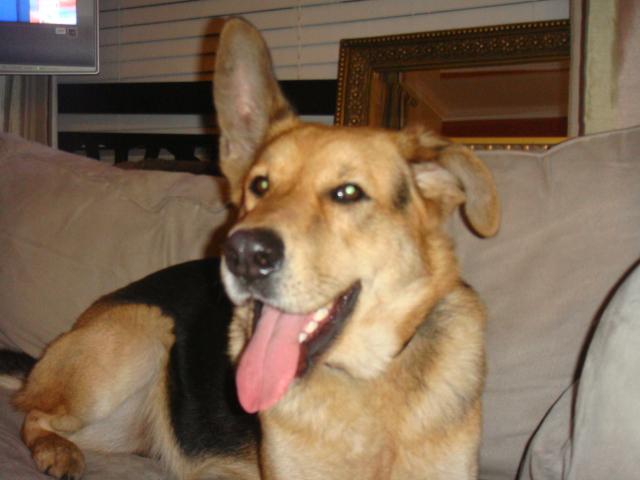QuestionHi Lori, We adopted an adult female 3 year old GSD 6 weeks ago from an animal shelter. We had her checked as soon as we got her, and found that she had tick fever, which has now been treated and cleared up. There were appetite issues related to the new home/change of food/tick fever/medication but after a while she ate her 2 meals a day normally. We are feeding her Purina Proplan based on salmon. I want to avoid the chicken formulas as so many GSDs are allergic to chicken (our last GSD was). This week she has stopped wanting to eat in the morning (not even treats). She only gets interested in food in the late afternoon and again in the evening. She is otherwise playful and in good spirits, has 2 long walks with some training and one short night walk every day. Is this eating behavior normal? Should we change her food to something else (maybe lamb-based?). Thanks in advance for your answer! Debbie
AnswerI would stick to the salmon, just offer her less. The worst thing you can do is to bribe a dog with rich foods into eating more than it needs. Instead, Put down the dish with what the dog should eat, and give it 15 minutes to eat. Then take it up. Do not give it anything to eat until its next scheduled meal. In a few days, it should be eating what it needs. Continue to check its ribs as illustrated at http://www.longliveyourdog.com/twoplus/RateYourDog.aspx and adjust the food as needed. This is not easy. I had a Shepherd go 3 days on a few nibbles. I was a wreck, but she was fine. It is almost unknown for a healthy dog not to eat what it needs. Unfortunately, in too many cases, it is less than the package says, and less than the owner thinks the dog should have. Many dogs are quite good at holding out for tastier chow. Like kids, sometimes it calls for tough love. If her ribs get to where they show a little, leave well enough alone.
Shepherds are no less likely to become allergic to salmon than chicken or corn. If a dog is going to develop food allergies, it will become allergic to what ever it is being fed. Corn and chicken allergies are common only because corn and chicken are very common ingredients. So stick to the salmon so that if she does become allergic to it, you have other things to make working around it easier.

 interested in adopting a puppy GSD.
Question
pic of the gsd puppy
Hey, im considering adopt
interested in adopting a puppy GSD.
Question
pic of the gsd puppy
Hey, im considering adopt
 puppy wont eat
Question
ava 8weeksweeks
i have a purebred german sheph
puppy wont eat
Question
ava 8weeksweeks
i have a purebred german sheph
 My German Shepherd Acts Scared
Question
Mannie
I have a male 1/2 German Shepherd 1/2 H
My German Shepherd Acts Scared
Question
Mannie
I have a male 1/2 German Shepherd 1/2 H
 tymber
Question
tymber
ok my gsd is now 7 months old and i hav
tymber
Question
tymber
ok my gsd is now 7 months old and i hav
 Shepherd ears/teeth
Question
Rosco
We have just taken in a shepherd that we
Shepherd ears/teeth
Question
Rosco
We have just taken in a shepherd that we